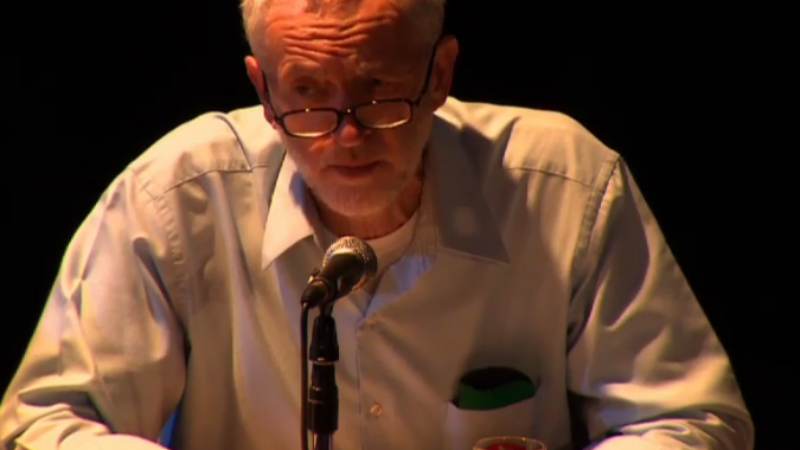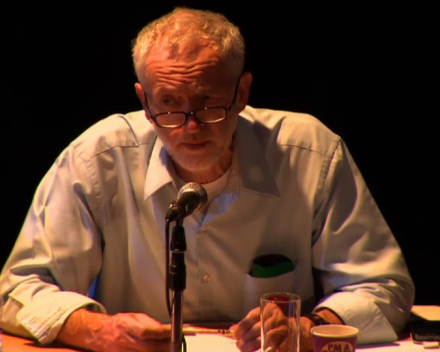
Have you heard about this thing called YouTube? It really is rather extraordinary. Some stray clicking last night brought me eventually to this clip of Tony Blair from over 20 years ago. At one point in the seven minute profile he says: “Being in opposition is playing [at] politics…it’s not the real thing. The real thing is in government.” It is an early display of steel from an unwrinkled and still boyish-looking Blair.

It is quite a challenge. And it forces one to ask: is Jeremy Corbyn serious? I don’t mean to suggest he isn’t serious about his views or the campaigns he has fought for in over 30 years as an MP. But is he serious about what it might take for Labour to win an election again and get into government, where it might be able to do something about the issues he cares about?
In truth most observers are pretty bamboozled by the apparent, if unquantifiable, surge in support for Corbyn, the candidate who only just got enough nominations from fellow MPs to enter the race, who didn’t seem to think he had a cat in hell’s chance of winning, who seemingly is, or was, more concerned about getting a seat on the foreign affairs select committee , and who only allowed his name to go forward out of a sense of duty and responsibility to the left. To his and everybody else’s surprise he finds himself possibly in the lead and at the very least standing out proudly from the remaining trio of Burnham, Cooper and Kendall.
Corbyn should be applauded. He has spoken calmly, clearly, and well. For over three decades he has been seen by many as a marginal figure at Westminster, and portrayed as something of an eccentric. Never before has he enjoyed so much extended, primetime coverage. Never before have his arguments been listened to and taken seriously by as many people as they are being now. It must be a pretty satisfying moment for him, and he has earned it through persistence and resilience.
He has also displayed some nifty political skills. He knows what he thinks and is unembarrassed saying it. His comfortable manner on platforms is the result of many years of practice. He has surely completed more than 10,000 hours of public speaking , which might be expected to lead to some level of proficiency.
When Nigel Farage rang in during the LBC leadership hustings last week to ask a question, Corbyn wrongly accused him of having been a banker. But when Farage explained that he had been a commodities trader, selling metals such as lead and zinc, Corbyn fired straight back with questions about where the lead had come from, and what conditions the miners had been working in. Standard campaigning stuff, you might think. But he showed a nimbleness and speed of thought that the other candidates, speaking more carefully, have not been able to match.
So (seemingly) relaxed is Corbyn that he was prepared to reflect on the Marr show yesterday morning whether or not he could be described as a Marxist. It made a change to see a political figure think out loud, perhaps even being amused by the danger in addressing the subject. But this again raises a question about this candidate’s seriousness about leading a Labour opposition into government. Does he think that target seats in England, where Labour failed to attract enough support, might be won by a party led by someone describing himself as possibly just a little bit Marxist? Moderate Ed Miliband was successfully portrayed by his opponents as being “too left wing”. What chance would Deep Red Jeremy stand?
Corbyn has to say he wants to be Labour leader, and prime minister, if his candidacy is to be taken seriously. But in all his time as an MP he has been a protester, a campaigner, an irritant to the leadership, an outsider looking in. He has not had to compromise his views. Deep down, do you think he really wants to be leader, or prime minister? Would a Labour party that is serious about trying to win the next election install a reluctant leader in (possibly) the worst job in British politics?
Corbyn has already succeeded. He has won a hearing for his agenda, and enthused thousands of people. He has challenged the party to take a stronger line on benefits cuts and remain true to its principles. He has shown why the left tradition deserves a hearing and respect. He has spoken for many. And he has taught his younger rivals a thing or two about debating and public speaking.
But is he really the answer to Labour’s continuing electoral difficulties? I don’t think so. And nor, I suspect, do you.




More from LabourList
Starmer or Sarwar: Scottish Labour MSPs and MPs split over Keir Starmer’s future
‘Every Lidl helps: What can the Government do to bring down food prices?’
Delivering in Government: your weekly round up of good news Labour stories